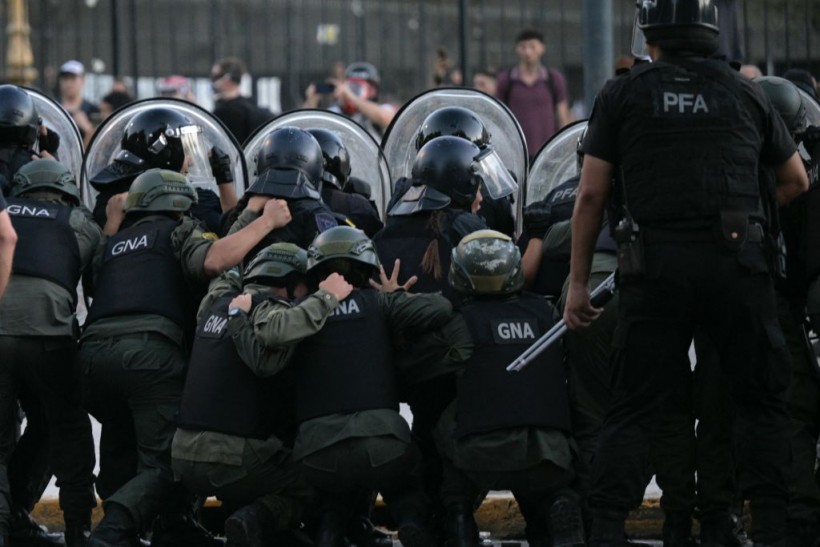Argentina's lower chamber of deputies granted overall approval to President Javier Milei's comprehensive reform bill on Friday following days of intense debate.
The contentious legislation, endorsed by 144 votes in favor and 109 against, marks a pivotal moment in Milei's push for substantial economic reforms in the face of mounting challenges.
Javier Milei's Reforms Spark Protests in Argentina

Members of the Argentine National Gendarmerie (GNA) protect themselves from demonstrators during a protest outside the Congress in Buenos Aires on February 2, 2024. Argentine lawmakers took a first step Friday toward approving President Javier Milei's sweeping economic, social and political reform package, which has sparked angry opposition protests.
The omnibus bill, encompassing more than 300 articles covering economic, administrative, criminal, and environmental changes, has been a focal point of heated discussions within the lower chamber. The extensive reform package forms a critical component of Milei's strategy to address Argentina's economic crisis, characterized by soaring inflation exceeding 200%, dwindling foreign currency reserves, and impending debt repayments to creditors and investors.
Protests against Milei's proposed reforms have erupted outside the neoclassical congressional building, where demonstrators waving flags clashed with riot police. The scenes of confrontation have underscored the deeply polarized sentiments surrounding the reform bill.
The lower-house approval sets the stage for a subsequent vote on individual articles, scheduled to commence on February 6. While the general approval is a significant milestone, the legislation must navigate further scrutiny in the lower house, where negotiations over the finer details are ongoing. Additionally, the bill's fate ultimately rests on securing approval from the Senate.
Despite holding only a limited number of seats in the 257-seat chamber, Milei's La Libertad Avanza party garnered support from like-minded allies, including factions within the main centre-right Juntos por el Cambio coalition. The success in the lower house is a testament to Milei's adept political maneuvering, particularly evident when divisive spending reforms were dropped from the bill in a strategic move to enhance its appeal, as per to ABC News.
Javier Milei Thanks Opposition For People-Centric Support
Acknowledging the support received, Milei expressed gratitude to opposition leaders who recognized the historical context and prioritized the interests of the people over entrenched privileges. He emphasized the urgency of ending what he termed as the "caste and corporate republic" to uplift a population facing impoverishment and hunger.
While the omnibus legislation received general approval, some lawmakers voiced reservations, particularly regarding articles related to state company privatization and the delegation of legislative powers to the president. Other provisions in the bill seek to loosen state controls on the economy, reform administrative, health, and education sectors, and adjust public service and utility rates.
President Milei, a self-described libertarian and anarcho-capitalist, assumed office on December 10 with a commitment to substantial state spending cuts. The objective is to address a government budget deficit that, according to Milei, contributes to inflation, reaching a staggering 211% at the close of 2023. Since taking office, Milei has implemented measures such as a 50% devaluation of Argentina's currency, subsidy cuts in transport and energy, and a decision not to renew contracts for over 5,000 state employees hired before his presidency.
The aggressive plans set up demonstrations in Buenos Aires, which culminated in a one-day nationwide strike called by the biggest union last week. Milei's term, which has been characterized by major economic shifts and broad resistance, is about to face more difficulties as the reform package moves on to the Senate, where its future will be decided in the next weeks, according to The Guardian.
Related Article: Vladimir Putin Expected to Remain Russian President; Sources Claim He'll Re-Run in 2024









